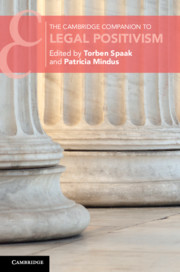Book contents
- The Cambridge Companion to Legal Positivism
- Cambridge Companions to Law
- The Cambridge Companion to Legal Positivism
- Copyright page
- Contents
- Figures
- Contributors
- Acknowledgements
- 1 Introduction
- Part I Fundamentals
- Part II History
- 5 The German Tradition of Legal Positivism
- 6 The French Tradition of Legal Positivism
- 7 The Italian Tradition of Legal Positivism
- 8 The British Tradition of Legal Positivism
- Part III Central Figures
- Part IV Main Tenets
- Part V Normativity and Values
- Part VI Critique
- Index
- References
6 - The French Tradition of Legal Positivism
from Part II - History
Published online by Cambridge University Press: 21 January 2021
- The Cambridge Companion to Legal Positivism
- Cambridge Companions to Law
- The Cambridge Companion to Legal Positivism
- Copyright page
- Contents
- Figures
- Contributors
- Acknowledgements
- 1 Introduction
- Part I Fundamentals
- Part II History
- 5 The German Tradition of Legal Positivism
- 6 The French Tradition of Legal Positivism
- 7 The Italian Tradition of Legal Positivism
- 8 The British Tradition of Legal Positivism
- Part III Central Figures
- Part IV Main Tenets
- Part V Normativity and Values
- Part VI Critique
- Index
- References
Summary
Troper considers five types of legal positivists in French legal thinking, namely, the exegetical school, the sociological school and Léon Duguit, Carré de Malberg, the Vichy scholars, and the analytical legal positivists. He explains that Carré de Malberg put forward a theory of positive law that aims to be descriptive, according to which positive law is a product of the will of the state and the state possesses an innate capacity to obligate the citizens by means of its laws. He points out, however, that while Carré de Malberg’s description of French positive law aims to reveal an essence of the state, in reality the description proceeds from a set of abstractions that reflect his own normative theory of the state; and that this means that Carré de Malberg, while professing to espouse a methodological version of legal positivism, is actually closer to defending ideological positivism.
Keywords
- Type
- Chapter
- Information
- The Cambridge Companion to Legal Positivism , pp. 133 - 151Publisher: Cambridge University PressPrint publication year: 2021
References
- 2
- Cited by

